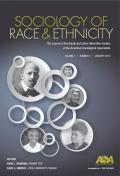
Abstract
Since the end of the Civil Rights Movement, large numbers of black people have made their way into settings previously occupied only by whites, though their reception has been mixed. Overwhelmingly white neighborhoods, schools, workplaces, restaurants, and other public spaces remain. Blacks perceive such settings as “the white space,” which they often consider to be informally “off limits” for people like them. Meanwhile, despite the growth of an enormous black middle class, many whites assume that the natural black space is that destitute and fearsome locality so commonly featured in the public media, including popular books, music and videos, and the TV news—the iconic ghetto. White people typically avoid black space, but black people are required to navigate the white space as a condition of their existence.